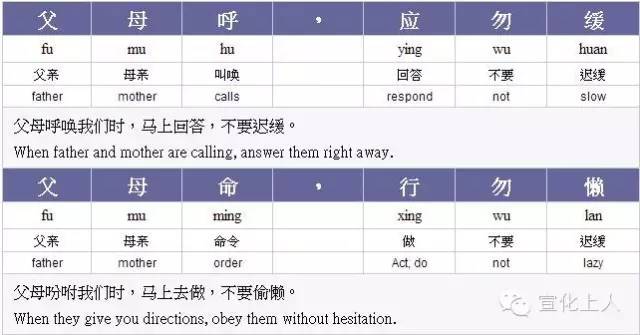
應,讀去聲,作動詞用,回答之意;不可讀平聲,而解作應該。呼,是高聲叫喚:父母或者在遠處,或者在別個房間,所以當父母需要我們時,就會提高了聲音來叫。假如我們不馬上答應,父母或者會以為我們不在,或者會以為我們沒聽見。於是一叫再叫的,嗓子叫啞了都有可能;再不然就是發起脾氣來了!這都很傷健康的。真孝順的孩子,不會希望父母傷身體,更不會裝聾作啞,甚至於被叫煩了,還反過來怪父母。
1.When Mother and Father are calling, answer them right away.
When our parents are far away or in another room, they may call out to us when they need us. If we do not respond right away, they may think that we are not around or that we did not hear them, and they will keep calling until they become hoarse or lose their temper, neither of which would be good for their health. A truly Filial child would not want his parents to ruin their health like that. He would not pretend to be deaf or mute when his parents called him, and he would not dare to disobey them even if he is annoyed at being called.
命是當面吩咐,或者是很威嚴地命令,或者是很和藹地交待,總之都得趕快去做,不要找藉口,拖拖拉拉的,或是陽奉陰違,當面答應卻背後搗鬼;又或者做得心不甘情不願的,甚至人前,背後發牢騷。這都不可以的。
2.When they give you directions, obey them without hesitation.
When our parents tell us to do something, whether sternly or gently. we should obey them right away and not look for excuses to procrastinate. We shouldn't act obedient in front of our parents but then disobey them behind their backs; nor should we do things in a reluctant manner and keep complaining in front of our parents or behind their backs.
教,在這裡也是個動詞,念平聲,教導。父母的人生經驗比我們豐富,當他們在指導我們怎麼待人,處事,接物時,我們都要恭恭敬敬地仔細聽明白,牢記在心。不可以當那話是耳邊風,看父母像老骨董。所謂“眾人是我師,我是眾人師。”別人不管好的不好的,都可以做我們的一面鏡子,何況是對自己的父母?父母說得對,要聽從;說得若不合理呢!也可以拿來做參考改進之用,怎麼可以不恭敬呢?
3.When your parents need to instruct you, respectfully do as you're told.
Our parents are much more experienced than we are, and so when they instruct us on how to communicate with other people and how to handle various situations, we should listen respectfully to their words, make sure we understand them, and remember them by heart. We shouldn't think our parents are too old-fashioned and simply let their words go in one ear and out the other. It is said, "All people are my teachers, and I am everyone's teacher." Whether other people are good or bad, we can always learn something from them; how much the more can we learn from our parents! We should listen to our parents if they are right, of course; and if they are unreasonable, we should still be respectful to them, but not follow their example.
再說假如我們做錯了,或者不能滿父母的心意,父母免不了要責備,或者疾言厲色地罵一頓,或者只溫和地教訓幾句。不管怎麼樣,都要溫馴地接受,不可爭辯,更不可強詞奪理來惹父母傷心生氣。
4.Whenever your parents must scold you, acknowledge your errors and faults.
If we do something wrong or we let down our parents' wishes, they may scold us severely or gently remonstrate with us. No matter how they react, we should compliantly accept their admonition, and not argue with them or make them angry or upset.
為什麼把這四項放在孝道之首?因為這是居家生活中,最常面臨的事情。父母子女間是否慈愛、孝順,在這些日常應對中,最容易反映出來。若做子女的,做不到這些,卻說有孝心,任誰也不相信的。可是我們人哪!最容易在這些日常的小事上忽略過去,以為沒什麼要緊;殊不知日積月累的,就足以傷透父母的心了!口口聲聲:“我是有那個孝心的!”有心無行,又有什麼用?
Why are these four sentences placed at the beginning of the discussion on filial piety? They deal with the most common situations that occur in our homes. We can easily tell from observing the daily interactions between parents and children whether the parents are loving and the children are filial. If the children claim to be filial and yet fail to practice these four basic rules in daily life, who will believe them? Unfortunately, we tend to neglect these small matters of daily life and think that they are no big deal. We don't realize that if we gradually accumulate these bad habits, we may end up breaking our parents' hearts. What's the use of claiming to be filial if we don't actually practice?
以前中國古時有個叫丁蘭的男子,性情十分粗魯,對相依為命的母親總是非打即罵,自己還不覺得那是不孝。有一天,他在田裡工作,忽然看見小鹿是跪著吃母鹿的奶,再看看枝頭的小烏鴉,忙進忙出的找食物喂老烏鴉;他猛然省悟到自己比禽獸還不如,決定等下母親送飯來時,要好好表現一下孝行。
In ancient China, there was a man named Ding Lan who was a rough fellow. Although he and his mother had only each other to rely upon, he often scolded and beat his mother without any sense of shame for his unfilial conduct. One day when he was working in the fields, he suddenly noticed a fawn kneeling down to drink its mother's milk. He also saw some young crows busily looking for food to feed their aging mother. Reflecting on the way he treated his own mother, he realized that he was not even as good as an animal. He made up his mind to be filial to his mother from then on.
母親送飯來得晚了,正急得害怕要挨打了,一見兒子朝他奔來,嚇得飯盒一丟,返身就逃。丁蘭一看更急得邊追邊叫媽,母親邊跑邊哭:“唉呀!我這回被抓到,准被打死了!真苦命啊!這樣活著沒意思啦!”見著池塘就跳了下去;等丁蘭趕到,水面只浮著一塊薄木板,再也找不到母親了!於是乎,悔恨交加的丁蘭便把木板當作母親,寫上母親的名字,供奉起來。這就是中國人供奉祖先牌位的由來。
But it just so happened that on that particular day, his mother was late in sending lunch to him, and she was afraid she would be scolded and beaten again. As she hurriedly walked toward her son, she saw Ding Lan running toward her. Terrified, she dropped the lunch box and turned and fled. When Ding Lan saw his mother running away, he shouted out and ran even faster, trying to tell her his intention. His mother cried as she ran, thinking, "If he catches me this time, he'll beat me to death for sure! What misery! It's meaningless to live in this world!" And so when she reached the riverbank, she threw herself in and committed suicide. When Ding Lan reached that place, he saw only a piece of wood floating on the river. Knowing that he would never see his mother again, he picked up the wood and took it home, where he treated it as his mother. He carved his mother's name on it, set it on the altar, and made offerings to it. And thus the Chinese custom of setting up memorial plaques to their ancestors began.
雖然丁蘭省悟了自己過去忤逆母親的不孝,但已是“樹欲靜而風不止;子欲養而親不待了!”所以孝順父母要及早,更要從這些每日的應對做起,培養自己的恭敬心,那便是孝的初步了!
Although Ding Lan deeply regretted his rebellious behavior, it was too late. So there is a saying, "The tree wants to be still, but the wind keeps on blowing: a child wishes to repay his parents' kindness, but they are gone." If we want to practice filial piety, we should start early by developing a respectful attitude toward our parents when we interact with them in daily life. That is the first step to being filial.
摘自法界佛教總會 (孫果秀注釋)